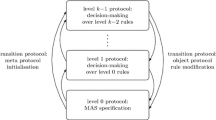Abstract
This paper explores the possibility of, and potential for, using a socio-cognitive theory of shame and embarrassment in agent-agent socio-economic interaction. We use this theory to specify an idea of digital blush, i.e. a representation of the state of embarrassment of an agent according to an evaluation of its behaviour by its peers. Through a detailed worked example, we demonstrate how digital blush offers a higher-level, finer-grained control of/over agent behaviour than typically strict, rule-based security mechanisms. We propose digital blush both as a computational device for self-regulation in certain types of multi-agent information trading applications, and, by representing an agent’s shame and embarrassment through some form of status visualisation, discuss its potential as a socio-technical device for affecting “presence”, especially in what we refer to as socio-cognitive grids.

Similar content being viewed by others
Explore related subjects
Discover the latest articles, news and stories from top researchers in related subjects.References
Amamiya M, Clark K, Iwao T, McCabe F, Okada M, Pitt J (2004) Individual digital rights management in multi-agent information trading economies. In: Kurumatani K (ed) Multi-agent systems for mass user support (MAMUS’03), LNAI. Springer, Berlin Heidelberg New York (in press)
Arafa Y, Mamdani A (2000a) Face-to-face interaction with an electronic personal sales assistant. In: Proceedings IEEE 6th conference on systems, man & cybernetics SMC2000, Nashville, TN, USA, 8–11 October 2000
Arafa Y, Mamdani A (2000b) A framework for communicating affect in multi-agent systems. In: Proceedings AAAI fall symposium. AAAI Press, Menlo Park, CA
Arafa Y, Mamdani A (2001) Personal sales assistant interfaces to e-commerce applications. In: Proceedings IJCAI’01 workshop on e-business and intelligent agents, Seattle, WA, 4–10 August 2001
Artikis A, Pitt J, Sergot M (2002) Animated specifications of computational societies. In: Castelfranchi C, Johnson L (eds) Proceedings AAMAS’02. ACM, New York, pp 1053–1062
Artikis A, Sergot M, Pitt J (2003) Specifying electronic societies with the causal calculator. In: Giunchiglia F, Odell J, Weiss G (eds) Proceedings AOSE’03, LNCS 2585:1–15. Springer, Berlin Heidelberg New York
Bing J, Sartor G (eds) (2003) The law of electronic agents: complex 4/03, Unipubskriftserier
Bing J, Sartor G, Pitt J (2003) Lovely Rita Meter Maid: a scenario on software agents and e-commerce. In: Pitt J (ed) The open agent society. Wiley, Chichester, UK
Castelfranchi C (2000) Affective appraisal vs. cognitive evaluation in social emotions and interactions. In: Paiva A (ed) Affective interactions: towards a new generation of computer interfaces, LNAI 1814:76–106. Springer, Berlin Heidelberg New York
Castelfranchi C, Falcone R (2000) Social trust: a cognitive approach. In: Trust and deception in virtual societies. Kluwer Academic, Dordrecht, pp 55–90
Conte R (2003) Cognitive and social factors in reputation. In: Pitt J (ed) The open agent society. Wiley, Chichester, UK
Conte R, Dellarocas C (eds) (2002) Social order in multi-agent systems. Kluwer, Dordrecht
Jones A, Sergot M (1996) A formal characterisation of institutionalized power. J Interest Group Pure Appl Logics 4:429–455
Kinny D, Georgeff M, Bailey J, Kemp D, Ramamohanarao K (1995) Active databases and agent systems: a comparison. In: Proceedings second international rules in database systems workshop, LNCS 985:342–356. Springer, Berlin Heidelberg New York
Kowalski R, Sergot M (1986) A logic-based calculus of events. New Generation Comput 4:67–96
Pitt J (2003a) Electronic agents in future e-commerce scenarios: some computational, social and legal aspects. In: Bing J, Sartor G (eds) The law of electronic agents: complex 4/03, Unipubskriftserier
Pitt J (2003b) Constitutive rules for agent communication languages. In: Proceedings 18th International Joint Conference on Artificial Intelligence, Acapulco, Mexico, pp 691–696
Pitt J (ed) (2004) The open agent society. Wiley, Chichester, UK (to appear)
Pitt J, Artikis A (2003) Socio-cognitive grids: a partial ALFEBIITE perspective. In: de Bruijn O, Stathis K (eds) Proceedings first international workshop on socio-cognitive grids. Santorini, Greece, 2003
Pitt J, Guerin F, Stergiou C (2000) Protocols and intentional specifications of multi-party agent conversations for brokerage and auctions. In: Proceedings autonomous agents 2000. ACM, New York, pp 269–276
Pitt J, Mamdani A (1999) Designing agent communication languages for multi-agent systems. In: Garijo F, Boman M (eds) Multi-agent system engineering MAAMAW’99, LNAI 1647:102–114. Springer, Berlin Heidelberg New York
Pitt J, Mamdani A, Charlton P (2001) The open agent society and its enemies: a position statement and programme of research. Telematics and Informatics 18:67–87
Rao A, Georgeff M (1995) BDI agents: from theory to practice. In Lesser V (ed) Proceedings ICMAS95. AAAI, Menlo Park, CA
Searle J (1969) Speech acts: an essay in the philosophy of language. Cambridge University Press, Cambridge
Acknowledgements
This research was partially supported by the European Union IST FET Project ALFEBIITE (IST-1999-10298). Particular thanks are due to the partners on this project, especially in this case Cristiano Castelfranchi, but also Alexander Artikis, Jon Bing, Andrew Jones, Giovanni Sartor and Marek Sergot. The insightful comments of the reviewers and the editors were especially helpful in revising the paper, and this input is much appreciated. The term ‘digital blush’ was invented by Wanli Cheng, and thanks for that.
Author information
Authors and Affiliations
Corresponding author
Rights and permissions
About this article
Cite this article
Pitt, J. Digital blush: towards shame and embarrassment in multi-agent information trading applications. Cogn Tech Work 6, 23–36 (2004). https://doi.org/10.1007/s10111-003-0144-9
Received:
Accepted:
Published:
Issue Date:
DOI: https://doi.org/10.1007/s10111-003-0144-9




